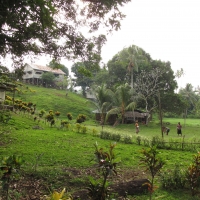Fiscal-food policies are likely misinformed by biased price elasticities from household surveys: evidence from Melanesia

Fiscal-food policies use taxes to alter relative food prices so as to change diets and are suggested for reducing non-communicable diseases in the Pacific. Price elasticity estimates used by advocates of fiscal-food policies are often biased and may make policy makers too optimistic about small taxes on unhealthy food and drink inducing big changes in diets. The bias is illustrated using the example of the demand for soft drinks in a household survey from the Solomon Islands, with further evidence from Papua New Guinea. About one-third of consumer response to soft drink price variation in the Solomon Islands is on the quantity margin, with two-thirds on the quality margin. If the quality response is wrongly treated as a quantity response to price—as in most studies—the price elasticity of soft drink demand is exaggerated by a factor of two in Papua New Guinea and three in the Solomon Islands.
Updated: 20 July 2024/Responsible Officer: Crawford Engagement/Page Contact: CAP Web Team











